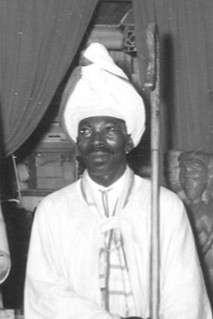Mallica Reynolds
Mallica Reynolds, OD (10 February 1911 – 24 February 1989), better known by the adopted name "Kapo", was a Jamaican artist and religious leader. Considered one of the greatest artists in Jamaica's "Intuitives" artistic movement, Kapo's religious beliefs were reflected in his work.
Kapo | |
|---|---|
 Kapo at the Hills Galleries in Kingston, Jamaica, 1957 | |
| Born | Mallica Reynolds 10 February 1911 |
| Died | 24 February 1989 (aged 78) |
| Resting place | National Heroes Park |
| Nationality | Jamaican |
| Known for | Painting, sculpture |
| Movement | Intuitives |
Biography
Mallica Reynolds was born in Byndloss, Saint Catherine Parish, Jamaica on 10 February 1911.[1] At the age of 12, Reynolds had a religious experience and began going by the name "Kapo".[2] At age 16, he received a vision and became a preacher. He later moved to Kingston, where he founded a Zion Revival church, St. Michael's Revival Apostolic Tabernacle.[3] Kapo was a leader in the Zion Revival movement, and from 1976 until his death, was the patriarch Bishop of St. Michael's Revival Apostolic Tabernacle.[2]
He began creating paintings in the 1940s, and he rose to national and international acclaim in the 1960s. Edward Seaga, a powerful politician who would go on to head the Jamaica Labour Party and later become the Prime Minister of Jamaica, and John Pringle, a founding figure in the Jamaican tourism industry, were both champions of Kapo's work.[3] The latter collected Kapo's work, and donated his collection to the National Gallery of Jamaica upon his death.[4] Roberta Flack, an American musician, was one of Kapo's patrons, and his portrait of her is now held by the American Folk Art Museum.[2] His works have been exhibited internationally, including six exhibitions in the United States between 1953 and 1982.[1]
Heavily influenced by his religious beliefs, Kapo believed that he was tasked by god to create paintings and sculptures.[2] Dr. Veerle Poupeye, the Executive Director of the National Gallery of Jamaica, wrote that "Kapo's paintings and sculptures, as a whole, depict his Zion Revival life world".[3] Poupeye noted that several of Kapo's works depicted Zion Revival ceremonies, music, and dance.[3] Kapo is considered a member of the "Intuitives" artistic movement; a label propagated by the National Gallery of Jamaica to describe self-taught artists that had previously been referred to as "Jamaican Primitives".[5] He is considered one of the movement's greatest artists.[4][6]
Kapo died on 24 February 1989, and was buried in National Heroes Park.[7]
Honors
One of Kapo's paintings, "Shining the Spring", was selected by the Jamaican government as a wedding gift for the 1981 Wedding of Prince Charles and Lady Diana.[1] In 1983, Kapo became the first artist to have a gallery exclusively of his work featured in an exhibition at the National Gallery of Jamaica.[5] He has been named to the Order of Distinction, and awarded the Norman Manley Award for Excellence in the Arts.[7] He was also awarded the Musgrave Gold Medal in 1985 by the Institute of Jamaica.[8]
References
- "Biographies of Jamaican Personalities (I-N)". Biographies of Jamaican Personalities. National Library of Jamaica. Retrieved 5 May 2014.
- "Mallica "Kapo" Reynolds". American Folk Art Museum. Retrieved 5 May 2014.
- Poupeye, Veerle. "Sound and Vision: Music and sound in the work of Kapo, Everald Brown and Woody Joseph – Part II". National Gallery of Jamaica blog. National Gallery of Jamaica. Retrieved 5 May 2014.
- Thomas, Christopher (2 May 2011). "Jamaica gets Kapo's works". Jamaica Gleaner. Gleaner Company Ltd. Retrieved 5 May 2014.
- Poupeye, Veerle (October 2007). "Intuitive Art as a Canon". Small Axe. 11 (3): 73–82. doi:10.1215/-11-3-73.
- Thomas, Polly; Adam Vaitilingam; Robert Coates (2010). The Rough Guide to Jamaica (5th ed.). London: Rough Guides. p. 63. ISBN 978-1-84836-513-1.
- "Great Jamaicans". Visit Jamaica. Jamaica Tourist Board. Retrieved 5 May 2014.
- "Musgrave Awardees". Institute of Jamaica. Archived from the original on 18 October 2014. Retrieved 6 February 2015.